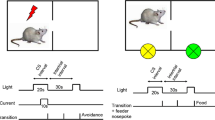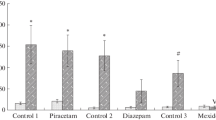Summary
-
1.
The shuttle-box method was used to train octopuses in an avoidance response. Unlike previous experiments, animals received now only 10 learning trials on Day 1 and 10 retention trials 3 days later. Time records were made of the animals movements in the box. No improvement in the performance occurred concerning anticipatory runs to the light compartment (ARs) neither was a decrease in the anticipatory run time (ART). But a significant decrease in the number of returns to the dark compartment (incorrect crossings, ICs) was recorded and the error time (ET) during which octopuses were receiving shocks was less on Day 4 than on Day 1. Thus, octopuses can learn with the shuttle-box method: a) to hold back spontaneous movements into darkness, b) to flee towards light quickly when a shock is received. On the other hand, it seems impossible to achieve a linkage between a change of illumination and a subsequent punishment.
-
2.
When an ECS was given immediately after the last trial on Day 1, results of Day 4 showed neither a fall in the number of ICs nor a reduction in the error time. But when ECS was given 6 hours afterwards changes similar to those of the control group occurred.
Similar content being viewed by others
References
Davis, R. E., P. J. Bright, and B. W. Agranoff: Effect of ECS and puromycin on memory in fish. J. comp. physiol. Psychol. 60, 162–166 (1965).
Duncan, C. P.: The retroactive effect of electroshock on learning. J. comp. physiol. Psychol. 42, 32–44 (1949).
Maldonado, H.: Effect of electroconvulsive shock on memory in Octopus vulgaris Lamarck. Z. Vergl. Physiol. 59, 25–37 (1968).
McGaugh, J. L.: Time-dependent processes in memory storage. Science 153, 1351–1358 (1966).
, and L. F. Petrinovich: Neural consolidation and electroconvulsive shock re-examined. Psychol. Rev. 73, 382–387 (1966).
Ransmeier, R. E.: The effects of convulsion, hypoxia, hypothermia, and anesthesia on retention in the hamster. Ph. D. thesis, University of Chicago 1953.
Zubin, J., and S. E. Barrera: Effect of electric convulsive therapy on memory. Proc. Soc. exp. Biol. (N.Y.) 48, 596–597 (1941).
Author information
Authors and Affiliations
Additional information
The author is indebted to Prof. J. Z. Young for valuable help and to G. D. Sanders for reading the manuscript.
Construction of apparatus used in this research has been sponsored by the Department of Scientific and Industrial Research, England. The table used in the Naples Zoological Station was sponsored by the American Institute of Biological Sciences.
Rights and permissions
About this article
Cite this article
Maldonado, H. Further investigations on the effect of electroconvulsive shock (ECS) on memory in Octopus vulgaris . Z. Vergl. Physiol. 63, 113–118 (1969). https://doi.org/10.1007/BF00298333
Received:
Issue Date:
DOI: https://doi.org/10.1007/BF00298333




